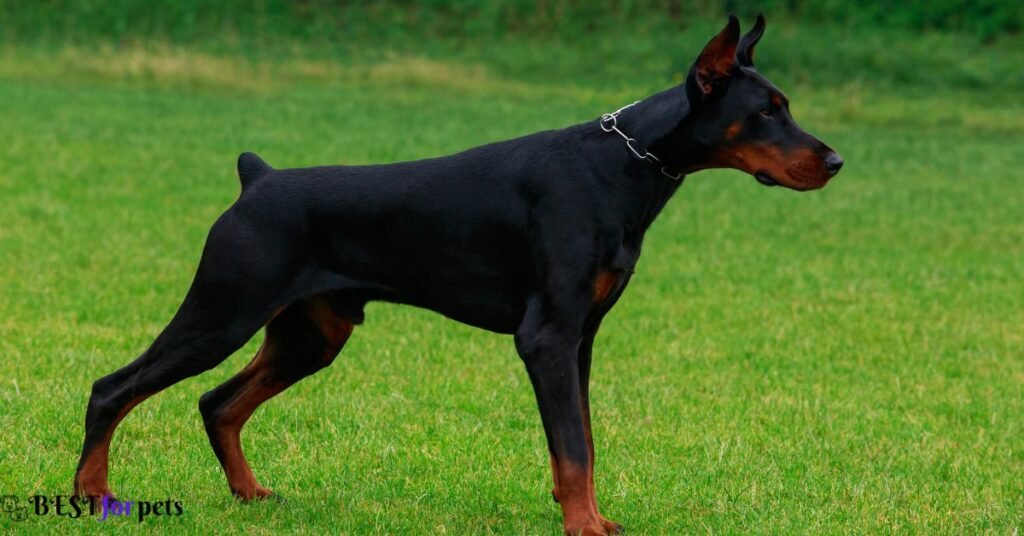Doberman Vs Rottweiler Comparison
Doberman vs Rottweiler: History and Origins
Doberman Pinscher
The Doberman Pinscher, often referred to simply as the Doberman, originated in Germany during the late 19th century. The breed was created by a tax collector named Louis Dobermann, who sought a loyal and fearless companion to accompany him on his rounds. Dobermann selectively bred various dog breeds, including the Rottweiler, Weimaraner, and German Pinscher, to develop the Doberman Pinscher we know today. The breed was initially used for guarding and protection, but over time, its role expanded to include military and police work due to its exceptional loyalty, intelligence, and trainability.
RottweilerThe Rottweiler has a much longer history, dating back to ancient Rome. This breed’s origins can be traced to the Molossus dogs used by the Roman army for herding and guarding livestock. As the Roman armies traveled, these dogs eventually settled in the town of Rottweil, Germany, where they continued their herding and guarding duties. The Rottweiler’s strong work ethic, physical strength, and protective nature made it an invaluable companion for drovers, protecting their cattle and ensuring safe passage to market.
Doberman vs Rottweiler: Temperament
Dobermans are known for their intelligence, loyalty, and protective instincts. They are highly trainable and eager to please their owners. Dobermans form strong bonds with their families and are often described as being affectionate and loyal companions. They are alert and vigilant, making excellent watchdogs. With proper socialization and training, Dobermans can be gentle and good-natured, making them suitable for families and individuals who can provide them with mental and physical stimulation.
Rottweilers have a confident, calm, and self-assured temperament. They are known for their natural guarding instincts and protective nature, making them excellent family protectors. Rottweilers are typically reserved with strangers but are generally affectionate, loyal, and loving towards their families. They are intelligent dogs and respond well to firm and consistent training. Early socialization is important to ensure that they grow into well-behaved and well-adjusted adults. Rottweilers thrive in families that can provide them with a sense of purpose and structure.

Doberman vs Rottweiler: Appearance and Characteristics
Doberman Pinscher
The Doberman is a medium to large-sized breed with a sleek, athletic build. They have a well-muscled body, deep chest, and a regal, alert expression.
The breed’s coat is short and smooth, typically in black, blue, red, or fawn colors, often with distinct rust-colored markings on their muzzle, chest, legs, and eyebrows. Dobermans have a proud, elegant stance and a distinctive trotting gait.
Rottweiler
The Rottweiler is a larger breed with a robust, muscular physique. They have a powerful build, broad chest, and a well-developed head. Their medium-length double coat is thick and straight, with a dense undercoat.
Rottweilers are predominantly black, often with rich mahogany markings on their cheeks, chest, legs, and eyebrows. They have a calm and confident appearance, exuding strength and stability.

Doberman Vs Rottweiler : Health
Dobermans, like many purebred dogs, are prone to certain health conditions. One of the most significant concerns in the breed is dilated cardiomyopathy (DCM), a heart condition that can be inherited. Regular cardiac screenings are essential to detect and manage this condition. Dobermans are also susceptible to hip dysplasia, a common orthopedic issue in large breeds. Other health concerns in Dobermans include von Willebrand’s disease (a blood clotting disorder) and hypothyroidism. Responsible breeding practices, regular veterinary check-ups, and a balanced diet are crucial in maintaining the overall health and well-being of Dobermans.
Rottweilers are generally a healthy breed, but they can be prone to certain health issues as well. Hip and elbow dysplasia, which can lead to joint pain and lameness, are common concerns. Like Dobermans, Rottweilers may also develop dilated cardiomyopathy (DCM), a heart condition that needs to be monitored. Certain types of cancer, such as bone cancer (osteosarcoma) and lymphoma, can also occur in Rottweilers. Regular veterinary care, a balanced diet, and appropriate exercise are crucial in keeping Rottweilers healthy.
Doberman Vs Rottweiler : Trainability
Dobermans are highly intelligent dogs that thrive on mental stimulation and are generally eager to please their owners. They are known for their trainability and excel in obedience training and various dog sports. Positive reinforcement methods, such as rewards-based training, work well with Dobermans. They are quick learners and respond positively to consistency and clear guidance. Early socialization is essential to expose them to different environments, people, and other animals. With proper training and socialization, Dobermans can become well-behaved and obedient companions.
Rottweilers are intelligent and trainable dogs. They possess a natural desire to please their owners, making them responsive to training. However, they can also have a strong-willed nature and may require firm and consistent handling. Rottweilers benefit from early socialization to ensure they develop good manners and appropriate behavior around people and other animals.
Positive reinforcement training methods, such as reward-based training and consistency, work well with Rottweilers. Training should focus on establishing boundaries, teaching basic obedience commands, and providing mental stimulation. Engaging in activities such as obedience trials, tracking, and agility can help channel their intelligence and energy.
Doberman Vs Rottweiler : Adaptability
Dobermans are adaptable dogs that can thrive in various living situations, including apartments or houses. They are generally best suited for families or individuals who can provide them with regular exercise and mental stimulation. Due to their short coat, Dobermans are sensitive to extreme temperatures and may require extra care in hot or cold climates.
Their loyalty and strong attachment to their families mean they may not do well if left alone for long periods. Dobermans require a significant amount of exercise and mental stimulation to prevent boredom and potential behavioral issues.
Rottweilers are adaptable dogs that can adjust to different living situations. They are generally best suited for families or individuals who can provide them with ample exercise and mental stimulation. Rottweilers have a thick double coat that helps protect them from various weather conditions, making them more tolerant of colder climates. However, they can also be sensitive to heat and may need appropriate shade and hydration during hot weather.
Like Dobermans, Rottweilers form strong bonds with their families and can become distressed if left alone for extended periods. Regular exercise, mental stimulation, and social interaction are crucial for their well-being and to prevent potential behavioral issues.
Doberman Vs Rottweiler : Nutrition
Doberman Pinscher Proper nutrition is essential for the overall health and well-being of a Doberman Pinscher. They are an active breed that requires a balanced diet to support their energy levels and maintain a healthy weight. Dobermans have a moderate metabolism and can be prone to certain health issues, such as dilated cardiomyopathy and bloat, so it is important to feed them high-quality dog food specifically formulated for their breed size and activity level.
A diet rich in lean proteins, healthy fats, and carbohydrates, along with appropriate portion control, can help prevent obesity and promote optimal muscle development in Dobermans.
Rottweiler Rottweilers, like Dobermans, benefit from a nutritious and well-balanced diet. They are a larger breed with moderate energy levels, so it is important to provide them with a diet that meets their nutritional needs without causing excessive weight gain. Rottweilers can be prone to joint issues, such as hip and elbow dysplasia, so a diet that supports joint health, including supplements like glucosamine and chondroitin, may be beneficial.
High-quality dog food with adequate protein, healthy fats, and appropriate levels of carbohydrates, along with regular feeding schedules and portion control, can help Rottweilers maintain a healthy weight and overall wellness.
Frequently Asked Questions
Are Dobermans and Rottweilers good with children?
Both breeds can be good with children when properly socialized and trained from a young age. However, due to their size and protective nature, supervision is always recommended when they are around small children.
Do Dobermans and Rottweilers get along well with other pets?
With proper socialization and training, both breeds can coexist with other pets. However, their strong prey drive and protective instincts may require careful introductions and ongoing supervision, especially with smaller animals.
Do Dobermans and Rottweilers have any specific health concerns?
Both breeds can be prone to certain health issues. Dobermans may be at risk for dilated cardiomyopathy, hip dysplasia, and von Willebrand’s disease. Rottweilers are prone to hip and elbow dysplasia, heart disease, and certain types of cancer. Regular veterinary check-ups and responsible breeding practices can help mitigate these risks.
Do Dobermans and Rottweilers require a lot of exercises?
Yes, both breeds are active and require regular exercise to maintain their physical and mental well-being. Daily walks, playtime, and engaging activities are necessary to keep them stimulated and prevent boredom.
Which breed is more suitable for first-time dog owners?
While both breeds can be suitable for first-time dog owners, the Doberman Pinscher may be more challenging due to its high energy levels and need for consistent training and mental stimulation. The Rottweiler, with its calm and confident nature, may be more manageable for novice owners.
Which breed is more protective?
Both breeds have protective instincts, but Rottweilers are generally known for being more naturally protective. They are often used as guard dogs and excel in roles where protection is required. Dobermans can also be protective but are more inclined to be loyal and obedient companions.

